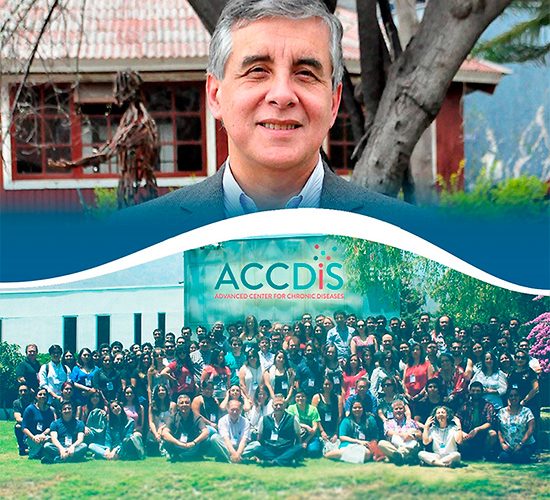Study center led by Senator Sergio Lavandero ranked third in the SCImago 2020 institutions ranking

Advanced Center for chronic diseases, chaired by University Senator Sergio Lavandero, was recognized among the best Chilean research institutions in the SCImago Institutions Ranking (SIR) 2020. Among the contributions of the ACCDiS is its collaboration to overcome the emergency by COVID-19 in the country.
Among the best Chilean research institutions selected by the SCImago Institutions Ranking (SIR) 2020 ranked third on Advanced Center for chronic diseases (ACCDiS ) -led by the University Senator and academic of the Faculties of Chemical and Pharmaceutical Sciences and Medicine of the U. of Chile, Sergio Lavandero–.
At the Latin American level he stood out in the top 30, while in the innovation aspect it reached the seventh place in the region. This annual ranking ranks higher education institutions around the world based on their research performance, innovation and social impact results.
ACCDiS was born as a collaborative project between the University of Chile and the Pontifical Catholic University seven years ago, thanks to funding from the National Research and Development Agency's FONDAP Project (ANID). This multidisciplinary center develops high-level research on genetic elements, environmental and social diseases that determine the development of chronic noncommunicable diseases, such as cardiovascular pathologies and cancer. Its objective is to provide with prevention and treatment alternatives to influence health proposals and positively impact people's well-being.
“They are diseases that have components that are not traditional. Therefore, prevent them is very complex because many of them are behaviors that we learn very early, for example, Obesity”, explained University Senator Sergio Lavandero in the radio program Air Education.
Commitment to society
Through more than twenty disciplines, ranging from social sciences to medicine, ACCDiS researchers address all dimensions of these diseases that are incurable. For this they have developed various initiatives in direct contact with society. Among them is Mauco, a long-term project that involves observing for ten years a portion of the adult population of the commune of Molina, Maule region, to study the factors that influence or prevent the development of some chronic diseases.
“Our work is very varied and super enriching. During these years we have had a mutual learning, and that's the key to success in getting this third place. Working as a team. We have a select group from the University of Chile and the Catholic University. They've always seen us as competitors, but we're showing that when we unite our talents for the benefit of society we can make important contributions”, valuated Senator Lavandero in Air Education.
The COVID-19 pandemic has called on all specialists at the University of Chile to seek various solutions through their knowledge. ACCDiS is working across different lines to contribute its expertise in analysis and outreach. This is why five members of the centre participate in the expert table that advises the Ministry of Health. In addition, are delivering information to the Data Bureau, also made up of University Senators Leonardo Basso and Jaime Ortega.
According to the director of ACCDiS, Senator Lavandero, this crisis presents an opportunity to “demonstrate that science is at the service of people, especially that governments and states take into account that problems are solved with scientific knowledge”.
Also, the specialist points out that this pandemic also shows the socioeconomic inequality that exists in the country. “Normally the most affected are those most helpless. In fact, the impact of chronic noncommunicable diseases on the most vulnerable groups is much greater than in those with a higher socioeconomic standard. Therefore, coronavirus has a greater impact on these groups and, that's why, you don't just have to look at the health aspect, but also economic and social”, Senator Lavandero said.
